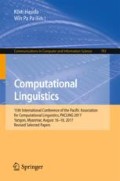Abstract
The trigram ‘I love being’ is expected to be followed by positive words such as ‘happy’. In a sarcastic sentence, however, the word ‘ignored’ may be observed. The expected and the observed words are, thus, incongruous. We model sarcasm detection as the task of detecting incongruity between an observed and an expected word. In order to obtain the expected word, we use Context2Vec, a sentence completion library based on Bidirectional LSTM. However, since the exact word where such an incongruity occurs may not be known in advance, we present two approaches: an All-words approach (which consults sentence completion for every content word) and an Incongruous words-only approach (which consults sentence completion for the 50% most incongruous content words). The approaches outperform reported values for tweets but not for discussion forum posts. This is likely to be because of redundant consultation of sentence completion for discussion forum posts. Therefore, we consider an oracle case where the exact incongruous word is manually labeled in a corpus reported in past work. In this case, the performance is higher than the all-words approach. This sets up the promise for using sentence completion for sarcasm detection.
Access this chapter
Tax calculation will be finalised at checkout
Purchases are for personal use only
Notes
- 1.
Source: Oxford Dictionary.
- 2.
Content words are words that are not function words. We ignore function words in a sentence.
- 3.
- 4.
- 5.
- 6.
- 7.
This tweet is labeled as sarcastic in the dataset by [12].
References
Tsur, O., Davidov, D., Rappoport, A.: ICWSM-a great catchy name: semi-supervised recognition of sarcastic sentences in online product reviews. In: ICWSM (2010)
Reyes, A., Rosso, P., Veale, T.: A multidimensional approach for detecting irony in twitter. Lang. Res. Eval. 47(1), 239–268 (2013)
Joshi, A., Tripathi, V., Patel, K., Bhattacharyya, P., Carman, M.: Are word embedding-based features for sarcasm detection? In: EMNLP (2016)
Khattri, A., Joshi, A., Bhattacharyya, P., Carman, M.J.: Your sentiment precedes you: using an author’s historical tweets to predict sarcasm. In: WASSA, p. 25 (2015)
Veale, T., Hao, Y.: Detecting ironic intent in creative comparisons. In: ECAI, vol. 215, pp. 765–770 (2010)
Maynard, D., Greenwood, M.A.: Who cares about sarcastic tweets? investigating the impact of sarcasm on sentiment analysis. In: LREC (2014)
Gibbs, R.W.: The Poetics of Mind: Figurative Thought, Language, and Understanding. Cambridge University Press, New York (1994)
Ivanko, S.L., Pexman, P.M.: Context incongruity and irony processing. Discourse Process. 35(3), 241–279 (2003)
Zweig, G., Burges, C.J.: The microsoft research sentence completion challenge. Technical Report MSR-TR-2011-129, Microsoft. Technical report (2011)
Melamud, O., Goldberger, J., Dagan, I.: context2vec: learning generic context embedding with bidirectional LSTM. In: CONLL, pp. 51–61 (2016)
Joshi, A., Sharma, V., Bhattacharyya, P.: Harnessing context incongruity for sarcasm detection. In: ACL-IJCNLP, vol. 2, pp. 757–762 (2015)
Riloff, E., Qadir, A., Surve, P., De Silva, L., Gilbert, N., Huang, R.: Sarcasm as contrast between a positive sentiment and negative situation. In: EMNLP, pp. 704–714 (2013)
Rajadesingan, A., Zafarani, R., Liu, H.: Sarcasm detection on twitter: a behavioral modeling approach. In: ICWSM. ACM, pp. 97–106 (2015)
Wallace, B.C., Choe, D.K., Charniak, E.: Sparse, contextually informed models for irony detection: exploiting user communities, entities and sentiment. ACL 1, 1035–1044 (2015)
Wang, Z., Wu, Z., Wang, R., Ren, Y.: Twitter sarcasm detection exploiting a context-based model. In: Wang, J., Cellary, W., Wang, D., Wang, H., Chen, S.-C., Li, T., Zhang, Y. (eds.) WISE 2015. LNCS, vol. 9418, pp. 77–91. Springer, Cham (2015). https://doi.org/10.1007/978-3-319-26190-4_6
Joshi, A., Tripathi, V., Bhattacharyya, P., Carman, M.: Harnessing sequence labeling for sarcasm detection in dialogue from TV series ‘friends’. In: CoNLL, p. 146 (2016)
Silvio, A., Wallace, B.C., Lyu, H., Silva, P.C.M.J.: Modelling context with user embeddings for sarcasm detection in social media. In: CoNLL 2016, p. 167 (2016)
Mikolov, T., Chen, K., Corrado, G., Dean, J.: Efficient estimation of word representations in vector space, arXiv preprint arXiv:1301.3781 (2013)
Liu, Q., Jiang, H., Wei, S., Ling, Z.-H., Hu, Y.: Learning semantic word embeddings based on ordinal knowledge constraints. In: ACL-IJCNLP (2015)
Walker, M.A., Tree, J.E.F., Anand, P., Abbott, R., King, J.: A corpus for research on deliberation and debate. In: LREC, pp. 812–817 (2012)
Pedersen, T., Patwardhan, S., Michelizzi, J.: Wordnet:: similarity: measuring the relatedness of concepts. In: Demonstration Papers at HLT-NAACL. Association for Computational Linguistics 2004, pp. 38–41 (2004)
Ghosh, D., Guo, W., Muresan, S.: Sarcastic or not: word embeddings to predict the literal or sarcastic meaning of words. In: EMNLP (2015)
Author information
Authors and Affiliations
Corresponding author
Editor information
Editors and Affiliations
Rights and permissions
Copyright information
© 2018 Springer Nature Singapore Pte Ltd.
About this paper
Cite this paper
Joshi, A., Agrawal, S., Bhattacharyya, P., Carman, M.J. (2018). Expect the Unexpected: Harnessing Sentence Completion for Sarcasm Detection. In: Hasida, K., Pa, W. (eds) Computational Linguistics. PACLING 2017. Communications in Computer and Information Science, vol 781. Springer, Singapore. https://doi.org/10.1007/978-981-10-8438-6_22
Download citation
DOI: https://doi.org/10.1007/978-981-10-8438-6_22
Published:
Publisher Name: Springer, Singapore
Print ISBN: 978-981-10-8437-9
Online ISBN: 978-981-10-8438-6
eBook Packages: Computer ScienceComputer Science (R0)

